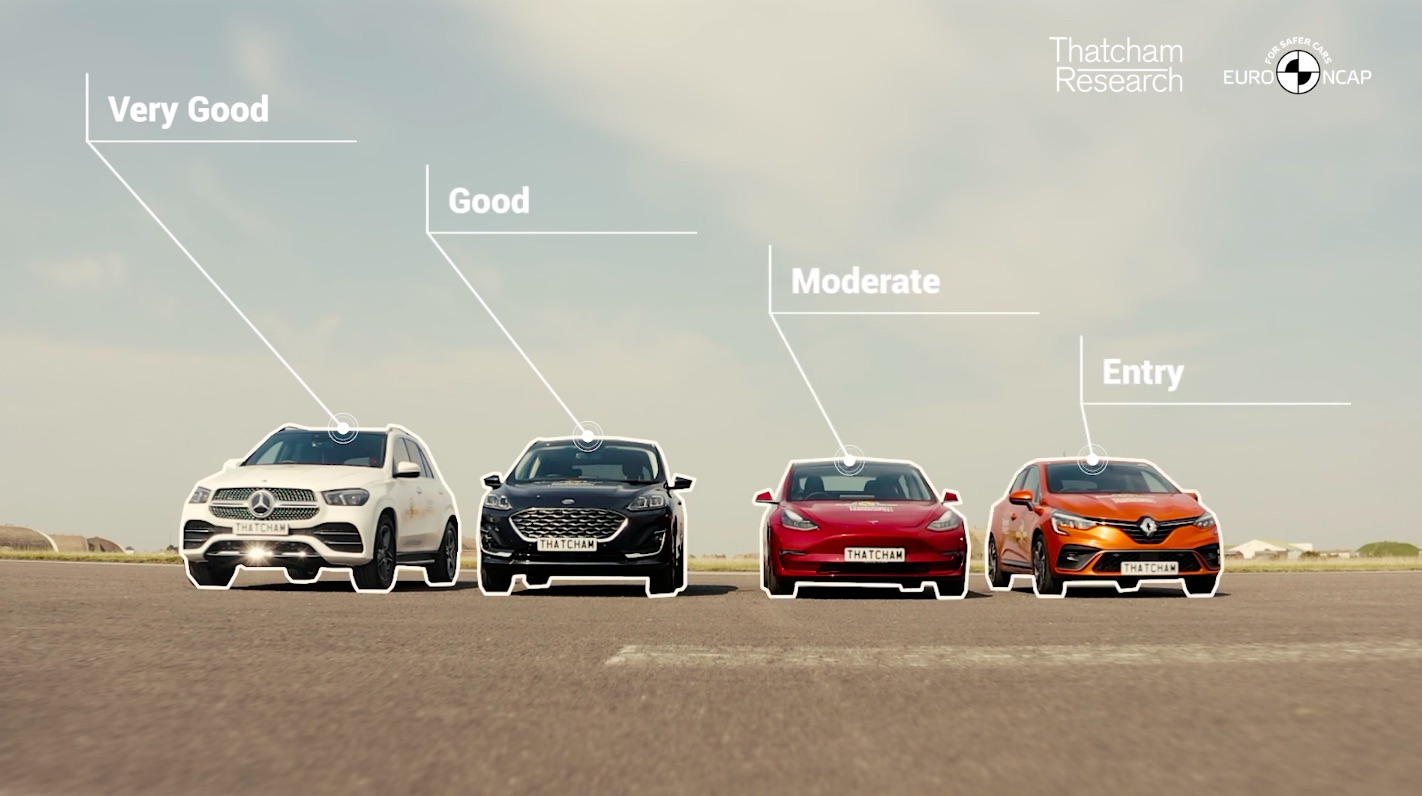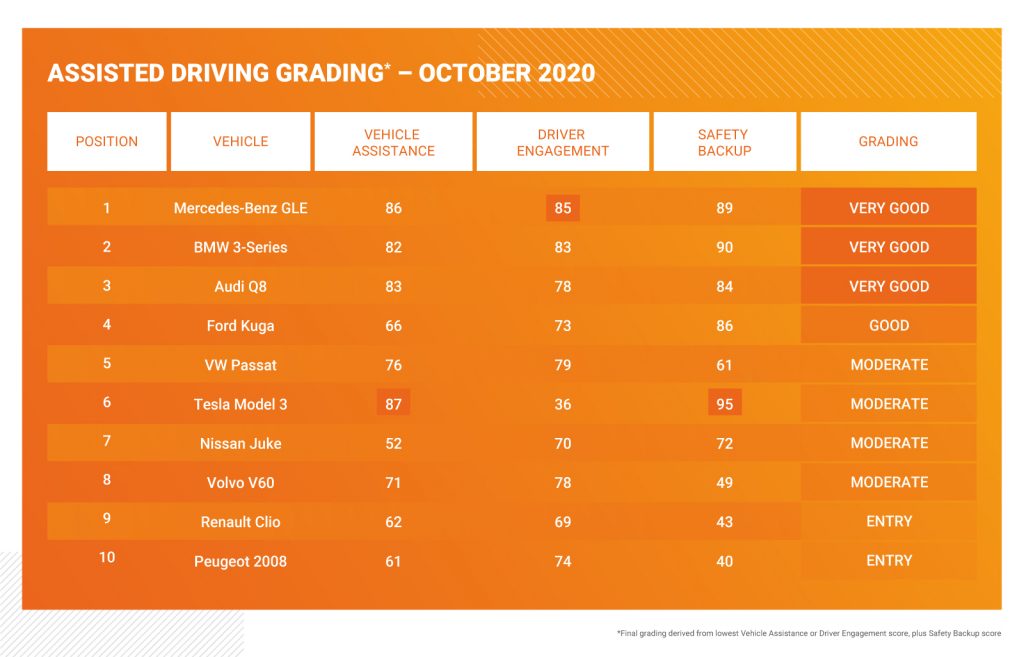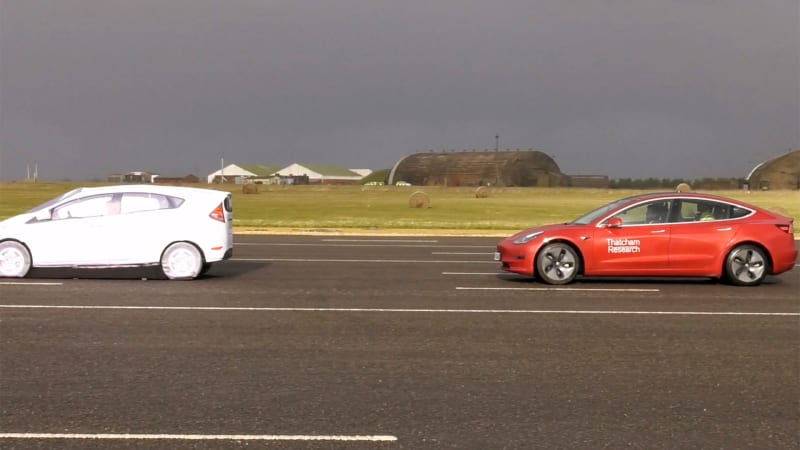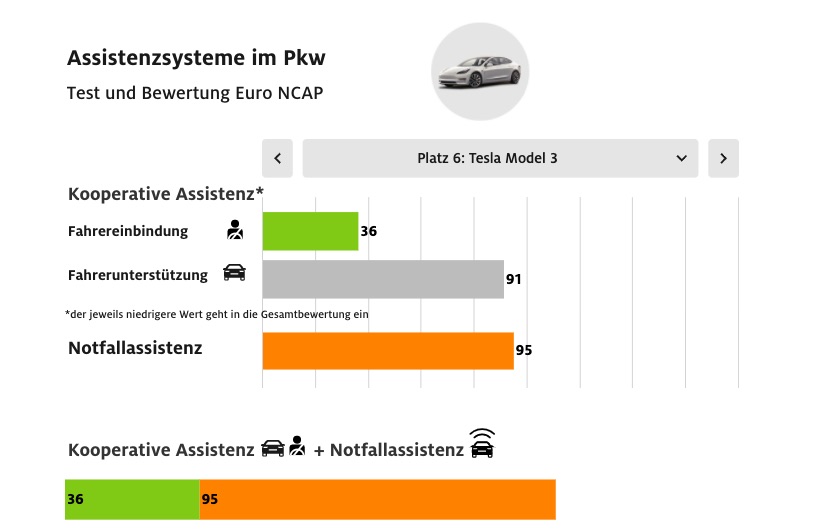

News
Tesla Model 3 gets penalized in Europe despite top scores in vehicle assistance and safety
In collaboration with Thatcham Research, the Euro NCAP has launched the world’s first Assisted Driving Grading system, a new set of metrics that are specifically designed to evaluate the driver-assist systems of cars available on the market today. For its first batch of vehicles, the firms evaluated 10 cars, from premium SUVs like the Mercedes-Benz GLE to affordable hatchbacks like the Renault Clio to all-electric vehicles like the Tesla Model 3.
As noted by Thatcham Research Director of Insurance Research Matthew Avery in a video outlining the results of the Assisted Driving Grading system’s first tests, vehicles would be graded on three metrics: the level of vehicle assistance that they provide, the level of driver engagement that they offer, and the effectiveness of their safety backup systems. The results of these tests, especially on the Tesla Model 3’s part, were rather peculiar, to say the least.
Out of 10 vehicles that were evaluated, the Tesla Model 3 ranked 6th with a “Moderate” grade, falling behind the Mercedes-Benz GLE, BMW 3-Series, and Audi Q8, which were graded as “Very Good,” and the Ford Kuga, which received a “Good” rating. This was despite the Tesla Model 3 receiving the top scores in the “Vehicle Assistance” and “Safety Backup” metrics.

The study, for example, dubbed the Model 3 as outstanding in terms of steering assistance, with the vehicle steering itself exceptionally well through an S-shaped curve at speeds of 80, 100, and 120 km/h. Tesla’s lane change systems were also satisfactory, despite the system’s limitations in Europe. Distance control was dominated by the Model 3 as well, with the evaluators stating that Tesla’s adaptive cruise control featured a “high level of technical maturity.” From a score of 100, Tesla’s vehicle assistance received a score of 87, the highest among the cars tested.
The Model 3’s safety backup systems were also a league above its competition. As noted in a post from the Allgemeiner Deutscher Automobil-Club e.V. (ADAC), Tesla demonstrated its strengths with the Model 3’s collision avoidance systems. The all-electric sedan earned a perfect score in the firms’ tests, outperforming its premium German competition. Overall, the Model 3 received an impressive score of 95 in the Assisted Driving Grading system’s “Safety Backup” metric.
Considering these scores, one might wonder why the Model 3 ended up ranked 6th among the 10 vehicles tested by the Euro NCAP and Thatcham Research. As it turned out, this was because of the Model 3’s poor scores in the “Driver Engagement” metric, where the vehicle only earned a score of 35 out of 100. So poor was the Model 3’s scores in this metric that it was ranked last among the 10 vehicles that were evaluated.

A look at the reasons behind the Model 3’s poor scores in “Driver Engagement” includes a number of interesting insights from Thatcham Research and the Euro NCAP. When testing the vehicles’ steering override functions, for example, the evaluators stated that the Model 3 resisted steering overrides from its driver. These issues were explained in the ADAC’s post.
“Should the driver make a steering movement in order to avoid an object or a pothole in the roadway, the steering assistant should allow this without resistance. In the Tesla Model 3, for example, this is not the case. Apparently, Tesla trusts the system more than its driver. The necessary cooperative assistance is not given. Instead, the Tesla system prevents its driver from attempting to intervene – it mustn’t be,” the ADAC remarked in its post.
Even more interesting is that part of the Model 3’s poor “Driver Engagement” scores was due to the term “Autopilot,” which Tesla uses to describe its driver-assist suite. The evaluators argued that the term “Autopilot” was misleading and irresponsible on Tesla’s part, and this was heavily taken against the Model 3’s rankings in the Assisted Driving Grading system.

“When it comes to the first test criterion – consumer information – the Tesla Model 3 in particular fails. The assistance systems are referred to as “Autopilot” in the operating instructions for the Model 3 as well as in the sales brochures and in marketing. However, the term suggests capabilities that the system does not have in sufficient measure. It tempts the driver to rely on the capabilities of the system – which is currently not allowed by the legislature anyway. Due to its good quick-start operating aid, the Tesla Model 3 still receives 10 points,” the evaluators noted.
Ultimately, these complaints about Autopilot’s branding ended up pulling down the Model 3’s scores to the point where the all-electric sedan was ranked below the Ford Kuga. Thatcham Research Director of Insurance Research Matthew Avery explained this in a video released about the evaluation. “The Tesla Model 3 was the best for safety backup and vehicle assistance but lost ground for misleading consumers about the capability of its Autopilot system and actively discouraging drivers from engaging when behind the wheel,” Avery said.
As noted by Avery, it is pertinent for vehicles to exhibit a balance to score very well in the Assisted Driving Grading system. This was not achieved by the Model 3 despite its industry-leading backup safety systems and actual vehicle assistance tech. ADAC explained it best when outlining why the Tesla Model 3 lost to four other vehicles despite being equipped with what is noticeably the most advanced driver-assist system.
“When analyzing the test results, it is noticeable that the Tesla Model 3 has the most advanced assistance systems. With 95 points for emergency assistance (Safety Backup) and 91 points for technical assistance, it doesn’t beat the Mercedes GLE by far, but at least 11 points… Because Euro NCAP removes the many points in the area of driver support from the Tesla, because on the one hand it does not sufficiently comply with the driver’s request for a steering correction. On the other hand, because Tesla is irresponsible about the term autopilot – an even more serious reason. With only 36 points from the test area driver integration, the Tesla falls back to sixth place in the final bill,” the ADAC noted.
Thatcham Research’s overall findings could be viewed in the video below.
News
Tesla cleared in Canada EV rebate investigation
Tesla has been cleared in an investigation into the company’s staggering number of EV rebate claims in Canada in January.

Canadian officials have cleared Tesla following an investigation into a large number of claims submitted to the country’s electric vehicle (EV) rebates earlier this year.
Transport Canada has ruled that there was no evidence of fraud after Tesla submitted 8,653 EV rebate claims for the country’s Incentives for Zero-Emission Vehicles (iZEV) program, as detailed in a report on Friday from The Globe and Mail. Despite the huge number of claims, Canadian authorities have found that the figure represented vehicles that had been delivered prior to the submission deadline for the program.
According to Transport Minister Chrystia Freeland, the claims “were determined to legitimately represent cars sold before January 12,” which was the final day for OEMs to submit these claims before the government suspended the program.
Upon initial reporting of the Tesla claims submitted in January, it was estimated that they were valued at around $43 million. In March, Freeland and Transport Canada opened the investigation into Tesla, noting that they would be freezing the rebate payments until the claims were found to be valid.
READ MORE ON ELECTRIC VEHICLES: EVs getting cleaner more quickly than expected in Europe: study
Huw Williams, Canadian Automobile Dealers Association Public Affairs Director, accepted the results of the investigation, while also questioning how Tesla knew to submit the claims that weekend, just before the program ran out.
“I think there’s a larger question as to how Tesla knew to run those through on that weekend,” Williams said. “It doesn’t appear to me that we have an investigation into any communication between Transport Canada and Tesla, between officials who may have shared information inappropriately.”
Tesla sales have been down in Canada for the first half of this year, amidst turmoil between the country and the Trump administration’s tariffs. Although Elon Musk has since stepped back from his role with the administration, a number of companies and officials in Canada were calling for a boycott of Tesla’s vehicles earlier this year, due in part to his association with Trump.
News
Tesla Semis to get 18 new Megachargers at this PepsiCo plant
PepsiCo is set to add more Tesla Semi Megachargers, this time at a facility in North Carolina.

Tesla partner PepsiCo is set to build new Semi charging stations at one of its manufacturing sites, as revealed in new permitting plans shared this week.
On Friday, Tesla charging station scout MarcoRP shared plans on X for 18 Semi Megacharging stalls at PepsiCo’s facility in Charlotte, North Carolina, coming as the latest update plans for the company’s increasingly electrified fleet. The stalls are set to be built side by side, along with three Tesla Megapack grid-scale battery systems.
The plans also note the faster charging speeds for the chargers, which can charge the Class 8 Semi at speeds of up to 1MW. Tesla says that the speed can charge the Semi back to roughly 70 percent in around 30 minutes.
You can see the site plans for the PepsiCo North Carolina Megacharger below.

Credit: PepsiCo (via MarcoRPi1 on X)

Credit: PepsiCo (via MarcoRPi1 on X)
READ MORE ON THE TESLA SEMI: Tesla to build Semi Megacharger station in Southern California
PepsiCo’s Tesla Semi fleet, other Megachargers, and initial tests and deliveries
PepsiCo was the first external customer to take delivery of Tesla’s Semis back in 2023, starting with just an initial order of 15. Since then, the company has continued to expand the fleet, recently taking delivery of an additional 50 units in California. The PepsiCo fleet was up to around 86 units as of last year, according to statements from Semi Senior Manager Dan Priestley.
Additionally, the company has similar Megachargers at its facilities in Modesto, Sacramento, and Fresno, California, and Tesla also submitted plans for approval to build 12 new Megacharging stalls in Los Angeles County.
Over the past couple of years, Tesla has also been delivering the electric Class 8 units to a number of other companies for pilot programs, and Priestley shared some results from PepsiCo’s initial Semi tests last year. Notably, the executive spoke with a handful of PepsiCo workers who said they really liked the Semi and wouldn’t plan on going back to diesel trucks.
The company is also nearing completion of a higher-volume Semi plant at its Gigafactory in Nevada, which is expected to eventually have an annual production capacity of 50,000 Semi units.
Tesla executive teases plan to further electrify supply chain
News
Tesla sales soar in Norway with new Model Y leading the charge
Tesla recorded a 54% year-over-year jump in new vehicle registrations in June.

Tesla is seeing strong momentum in Norway, with sales of the new Model Y helping the company maintain dominance in one of the world’s most electric vehicle-friendly markets.
Model Y upgrades and consumer preferences
According to the Norwegian Road Federation (OFV), Tesla recorded a 54% year-over-year jump in new vehicle registrations in June. The Model Y led the charge, posting a 115% increase compared to the same period last year. Tesla Norway’s growth was even more notable in May, with sales surging a whopping 213%, as noted in a CNBC report.
Christina Bu, secretary general of the Norwegian EV Association (NEVA), stated that Tesla’s strong market performance was partly due to the updated Model Y, which is really just a good car, period.
“I think it just has to do with the fact that they deliver a car which has quite a lot of value for money and is what Norwegians need. What Norwegians need, a large luggage space, all wheel drive, and a tow hitch, high ground clearance as well. In addition, quite good digital solutions which people have gotten used to, and also a charging network,” she said.
Tesla in Europe
Tesla’s success in Norway is supported by long-standing government incentives for EV adoption, including exemptions from VAT, road toll discounts, and access to bus lanes. Public and home charging infrastructure is also widely available, making the EV ownership experience in the country very convenient.
Tesla’s performance in Europe is still a mixed bag, with markets like Germany and France still seeing declines in recent months. In areas such as Norway, Spain, and Portugal, however, Tesla’s new car registrations are rising. Spain’s sales rose 61% and Portugal’s sales rose 7% last month. This suggests that regional demand may be stabilizing or rebounding in pockets of Europe.
-

 Elon Musk2 weeks ago
Elon Musk2 weeks agoTesla investors will be shocked by Jim Cramer’s latest assessment
-

 Elon Musk2 days ago
Elon Musk2 days agoxAI launches Grok 4 with new $300/month SuperGrok Heavy subscription
-

 Elon Musk4 days ago
Elon Musk4 days agoElon Musk confirms Grok 4 launch on July 9 with livestream event
-

 News1 week ago
News1 week agoTesla Model 3 ranks as the safest new car in Europe for 2025, per Euro NCAP tests
-

 Elon Musk2 weeks ago
Elon Musk2 weeks agoA Tesla just delivered itself to a customer autonomously, Elon Musk confirms
-

 Elon Musk1 week ago
Elon Musk1 week agoxAI’s Memphis data center receives air permit despite community criticism
-

 News2 weeks ago
News2 weeks agoXiaomi CEO congratulates Tesla on first FSD delivery: “We have to continue learning!”
-

 News2 weeks ago
News2 weeks agoTesla sees explosive sales growth in UK, Spain, and Netherlands in June
















